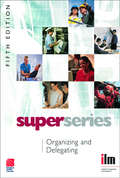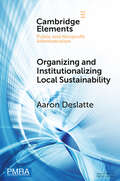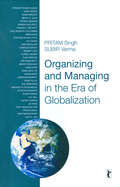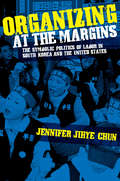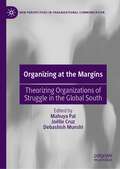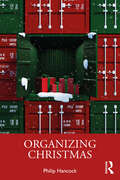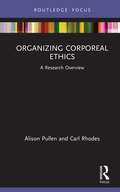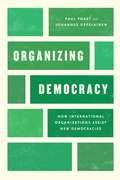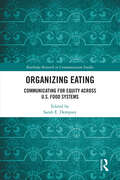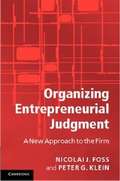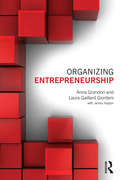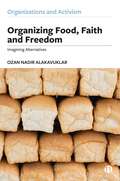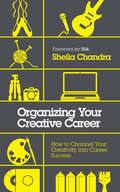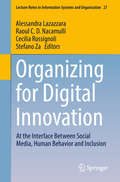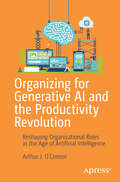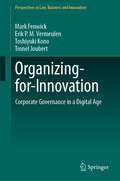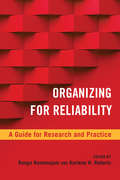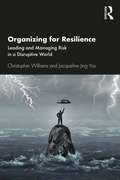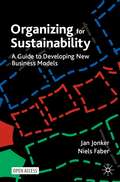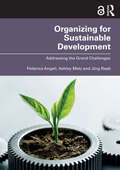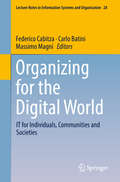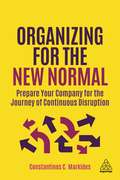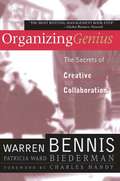- Table View
- List View
Organizing and Delegating (Institute of Learning & Management Super Series)
by Institute of Leadership & ManagementSuper series are a set of workbooks to accompany the flexible learning programme specifically designed and developed by the Institute of Leadership & Management (ILM) to support their Level 3 Certificate in First Line Management. The learning content is also closely aligned to the Level 3 S/NVQ in Management. The series consists of 35 workbooks. Each book will map on to a course unit (35 books/units).
Organizing and Institutionalizing Local Sustainability: A Design Approach (Elements in Public and Nonprofit Administration)
by Aaron DeslatteThis Element explores the role of public managers as designers. Drawing from systems-thinking and strategic management, a process-tracing methodology is used to examine three design processes whereby public managers develop strategies for adapting to climate change, build the requisite capabilities and evaluate outcomes. Across three cases, the findings highlight the role of managers as 'design- oriented' integration agents and point to areas where additional inquiry is warranted. This title is also available as Open Access on Cambridge Core.
Organizing and Managing in the Era of Globalization
by Pritam Singh Subir VermaThis book discusses the issues and challenges of organizing and managing in the context of a globalized world. It provides insights and perspectives on the realities of organization in a world where governance structures, organizational processes, management practices and employment relations are in a vortex of transformation. It analyzes the political, economic, sociological, cultural, institutional and legal factors that shape these realities. Globalization has thrown up fundamental questions on the identity, social values, national and local culture and history and even the future identity of societies. Managing and organizing a diverse organization in these times is, thus, a subject worth studying; Organizing and Managing in the Era of Globalization is an answer to this quest. This book will be useful for students and professionals of organizational design, organizational change and international management. Researchers in the fields of organization and management as well as globalization will also find it of immense value.
Organizing at the Margins: The Symbolic Politics of Labor in South Korea and the United States
by Jennifer Jihye ChunThe realities of globalization have produced a surprising reversal in the focus and strategies of labor movements around the world. After years of neglect and exclusion, labor organizers are recognizing both the needs and the importance of immigrants and women employed in the growing ranks of low-paid and insecure service jobs. In Organizing at the Margins, Jennifer Jihye Chun focuses on this shift as it takes place in two countries: South Korea and the United States. Using comparative historical inquiry and in-depth case studies, she shows how labor movements in countries with different histories and structures of economic development, class formation, and cultural politics embark on similar trajectories of change. Chun shows that as the base of worker power shifts from those who hold high-paying, industrial jobs to the formerly "unorganizable," labor movements in both countries are employing new strategies and vocabularies to challenge the assault of neoliberal globalization on workers' rights and livelihoods. Deftly combining theory and ethnography, she argues that by cultivating alternative sources of "symbolic leverage" that root workers' demands in the collective morality of broad-based communities, as opposed to the narrow confines of workplace disputes, workers in the lowest tiers are transforming the power relations that sustain downgraded forms of work. Her case studies of janitors and personal service workers in the United States and South Korea offer a surprising comparison between converging labor movements in two very different countries as they refashion their relation to historically disadvantaged sectors of the workforce and expand the moral and material boundaries of union membership in a globalizing world.
Organizing at the Margins: Theorizing Organizations of Struggle in the Global South (New Perspectives in Organizational Communication)
by Mahuya Pal Joëlle Cruz Debashish MunshiThis edited volume presents complex issues surrounding economic and cultural injustices in the global South and the social imaginaries articulated by vulnerable communities in these extractive zones. These organizations of struggle by disenfranchised members in the global South bring forth a collective of knowledge to decolonize organizational theory and think of organizing a more just world. The essays in this volume critique and connect meanings of “organizations” in relation to neoliberalism, coloniality, and social justice. More specifically, scholars engage with ideas of resistance such as invisible histories in management theory, hybrid collective action, self-determination and indigenous sovereignty, and decolonizing institutions. The chapters also cover a wide range of locations including feminist movements in Latin America, the struggles of Palestinians in self-exile to connect with their homeland, and reproductive labor in Sri Lanka to the decolonial potential of Black Lives Matter in the US and insights into organizing resistance in parts of Asia and Africa. For scholars and policymakers, this book presents emancipatory essays that interrogate the cultural, social, political, and historical issues pertaining to organizations in the context of the neoliberal economy.
Organizing Christmas
by Philip HancockOrganizing Christmas is an exploration of the organizational character of Christmas. Taking as its starting point the view that Christmas initially achieved popularity due to its potential to promote social cohesion and political stability, this book both charts and scrutinizes its global emergence as the year's preeminent economic and organizational event. Combining historical narrative, original interviews, and social scientific research and theories, it tells the story of how Christmas has come to dominate the festival landscape and how it emerged as an integral component of the global evolution of contemporary social and economic relations. From the pre-Christian celebrations and politics of the turning of the calendar year, through the power games of Elizabethan England and the wily reinvention of the season by industrious Victorians, to today’s huge economic and logistical exercise that relies on everything from global supply chains to the domestic division of labour, Organizing Christmas demonstrates how the season exemplifies the spirit and practices of industrial, and now post-industrial, modernity. As well as documenting this fact, however, Organizing Christmas also critically interrogates what has become a vast festive-industrial complex. From low-paid factory workers in Yiwu to Santa Claus performers in Kingston, readers are given a chance to consider what the cost of this global festival might be and whether it is a price worth paying. Drawing on intellectual resources ranging from Adorno and Horkheimer’s classic critique of the culture industry, thorough Böhme’s analysis of the sociomaterial production of atmospheres, to Bloch’s ‘principle of hope’, it paints a picture of Christmas as a profoundly important, if deeply contested historical, cultural and, most significantly, organizational phenomenon. Aimed at students and academics in Organization Studies, Cultural Studies, and the Sociology of Work and Employment, as well as the general reader interested in the festive season, Organizing Christmas offers a differing perspective on a subject so familiar and yet so often overlooked.
Organizing Corporeal Ethics: A Research Overview (State of the Art in Business Research)
by Alison Pullen Carl RhodesThis book explores the meaning and practice of corporeal ethics in organized life. Corporeal ethics originates from an emergent, embodied and affective experience with others that precedes and exceeds those rational schemes that seek to regulate it. Pullen and Rhodes show how corporeal ethics is fundamentally based in embodied affect, yet practically materialized in ethico-political acts of positive resistance and networked solidarity. Considering ethics in this way turns our attention to how people’s conduct and interactions might be ethically informed in the context of, and in resistance to, the masculine rationality of dominating organizational power relations in which they find themselves. Pullen and Rhodes outline the ways in which ethically grounded resistance and critique can and do challenge self-interested organizational power and privilege. They account for how corporeal ethics serves to destabilize the ways that organizations reproduce practices that negate difference and result in oppression, discrimination, and inequality. The book is suitable for students, scholars and citizens who want to learn more about the radical possibilities of how political actions arising from corporeal ethics can strive for equality and justice.
Organizing Democracy: How International Organizations Assist New Democracies (Chicago Series on International and Domestic Institutions)
by Paul Poast Johannes UrpelainenIn the past twenty-five years, a number of countries have made the transition to democracy. The support of international organizations is essential to success on this difficult path. Yet, despite extensive research into the relationship between democratic transitions and membership in international organizations, the mechanisms underlying the relationship remain unclear. With Organizing Democracy, Paul Poast and Johannes Urpelainen argue that leaders of transitional democracies often have to draw on the support of international organizations to provide the public goods and expertise needed to consolidate democratic rule. Looking at the Baltic states’ accession to NATO, Poast and Urpelainen provide a compelling and statistically rigorous account of the sorts of support transitional democracies draw from international institutions. They also show that, in many cases, the leaders of new democracies must actually create new international organizations to better serve their needs, since they may not qualify for help from existing ones.
Organizing Eating: Communicating for Equity Across U.S. Food Systems (Routledge Research in Communication Studies)
by Sarah E. DempseyThis book develops "organizing eating" as an organizational-communication centered framework for understanding how communication and power combine to actively shape eating and working in the U.S. food system. Drawing together established scholars, the book sheds light on how the interconnected aspects of power are communicative in nature, shaping and constraining the possibilities for organizing across the food system. The chapters provide grounded insight into the role of racism, corporate and state power, food cooperatives, urban farm systems, food policy, and labor practices, drawing attention to the pathways needed to pursue more equitable food systems. Providing readers with a set of useful critical conceptual tools and an understanding of communication frameworks, chapters identify common principles for critical organizing within the food movement and addresses the relevance of the COVID-19 pandemic and the national uprising against anti-Black violence for understanding the urgent possibilities of food justice. This cohesive collection of cutting-edge scholarship will be of interest to organizational communication scholars, critical/cultural communication scholars, environmental communication scholars, and health communication scholars; and the interdisciplinary fields of environmental studies, agriculture and food studies, and organization and labor studies.
Organizing Entrepreneurial Judgment
by Nicolai J. Foss Peter G. KleinEntrepreneurship, long neglected by economists and management scholars, has made a dramatic comeback in the last two decades, not only among academic economists and management scholars, but also among policymakers, educators and practitioners. Likewise, the economic theory of the firm, building on Ronald Coase's (1937) seminal analysis, has become an increasingly important field in economics and management. Despite this resurgence, there is still little connection between the entrepreneurship literature and the literature on the firm, both in academia and in management practice. This book fills this gap by proposing and developing an entrepreneurial theory of the firm that focuses on the connections between entrepreneurship and management. Drawing on insights from Austrian economics, it describes entrepreneurship as judgmental decision made under uncertainty, showing how judgment is the driving force of the market economy and the key to understanding firm performance and organization.
Organizing Entrepreneurship
by Anna Grandori Laura Gaillard GiordaniEntrepreneurship has regained centre stage in the contemporary knowledge-intensive and innovation-driven economy, as well as in research. Integrating classic and recent insights into the organization, economics and management of entrepreneurial activities, Organizing Entrepreneurship aims to blend rigor with relevance, and connects theory with practical problems around key questions, such as: Is there any method in having ‘good ideas’ and discovering opportunities? Through which mechanisms can human, social, technical and financial resources be attracted and dedicated to new projects? Which alternative governance and organizational structures are to be considered for the constitution and organization of a new firm? To grow or not to grow? (Or how to grow without up-sizing)? How do you organize grown-up firms in an entrepreneurial mode? How can environments and external institutions help? Original case studies are discussed and integrated throughout the text, which reflect a wide range of sectors (from agri-business to high tech) and countries (including emerging economies). Providing a unique resource for students and instructors of entrepreneurship and organization, this book also offers new insights to entrepreneurs and investors in the organization of new firms, as well as to managers striving to infuse entrepreneurial behaviors into their already established firms.
Organizing Food, Faith and Freedom: Imagining Alternatives (Organizations and Activism)
by Ozan Nadir AlakavuklarConsumerism, unsustainable growth, waste and inequalities continue to ail societies across the globe, but creative collectives have been tackling these issues at a grassroots level. Based on an autoethnographic study about a free food store in Aotearoa New Zealand, this book presents a first-hand account of how a community is organized around surplus food to deal with food poverty, while also helping the reader to see through the complexity that brings the free food store to life. Examining how alternative economies and relations emerge from these community solutions, the author shows it is possible to think, act and organize differently within and beyond capitalist dynamics.
Organizing for Creative People: How to Channel the Chaos of Creativity into Career Success
by Shelia Chandra‘Sheila gave me the tools to hunt success, and the infrastructure to handle it when it came.’ Stik, world renowned street artist and author Most of the conventional ‘productivity’ advice you’ll find in the ‘soft business’ section simply does not work for creative people. Surprisingly, to date there has not been a single book that addresses the unique organizational challenges that artists face. This book sets out to change that, it addresses the myth that truly creative people are messy and that they need mess in order to create. Sheila Chandra applies her professional insights as a ‘creative’ and organizing expert to the lives of other busy creative people in all disciplines – showing them how good organization can liberate their creative ‘magic’. She begins with artists’ physical spaces, including arranging their workspaces and offices so that they remain tidy effortlessly. Her career ‘headspace’ chapters cover: • creative well-being, including artist support systems • career well-being, including networking and collaborations • self-promotion and how to avoid working for free • making social media pay • personal branding, career planning and goals • how to manage copyright issues and legal paperwork • legacy management And all from an artist’s point of view. These fool-proof, tried and tested systems are mixed with creativity tips and artist well-being advice that only one artist knows to give another. Written with real affection for the reader, Sheila Chandra takes the creative person by the hand and puts them on the path to success.
Organizing for Decision Discipline: Mastering the Merger
by David Harding Sam RovitUnfortunately, one great deal rarely serves as a foundation for sustained shareholder value. To be great, you need to be able to repeat your deal-making success over and over again. This chapter discusses what it takes to institutionalize success.
Organizing for Digital Innovation: At the Interface Between Social Media, Human Behavior and Inclusion (Lecture Notes in Information Systems and Organisation #27)
by Alessandra Lazazzara Raoul C.D. Nacamulli Cecilia Rossignoli Stefano ZaThis book presents a collection of research papers exploring the human side of digital innovation management, with a specific focus on what people say and share on social media, how they respond to the introduction of specific IT tools, and how digital innovations are impacting sustainability and inclusion. Given the plurality of views that it offers, the book is particularly relevant for digital technology users, companies, scientists and governments. The overall spread of digital and technological advances is enhanced or hampered by people’s skills, behaviors and attitudes. The challenge of balancing the digital dimension with humans situated in specific contexts, relations and networks has sparked a growing interest in how people use and respond to digital innovations. The content of the book is based on a selection of the best papers – original double-blind peer-reviewed contributions – presented at the annual conference of the Italian chapter of the AIS, which was held in Milan, Italy, in October 2017.
Organizing for Generative AI and the Productivity Revolution: Reshaping Organizational Roles in the Age of Artificial Intelligence
by Arthur J. O’ConnorAs leaders plan to make significant investments to harness the power of foundational models such as ChatGPT, they need to understand the changes in organizational behaviors required for the successful implementation of such systems. The size, complexity and nature of this new wave of technologies requires a refresh in roles and responsibilities in conventional IT organizations. This book reveals practical and no-nonsense guidance on how to leverage generative AI to transform your business processes and organizational structures to achieve breakthroughs in efficiency, effectiveness and competitive advantage. Written in a lively, engaging, and often humorous style, this work provides practical insights and timely survival skills for leaders with anonymous but real-world experiences and case studies. If you’re looking to understand how large language foundation models such as ChatGPT are reshaping managerial roles and organizational structures, and how they can leverage this knowledge to survive and thrive in this brave new world then Organizing for Generative AI and the Productivity Revolution is the book for you. What You Will Learn Review the key changes in current state roles and responsibilities that are required to successfully deploy generative AI systems Examine the organizational reporting structures and associated incentives that form a strong generative AI system Understand the financial, regulatory, and operational risks created by organizational behavioral issues that arise when organizations build and deploy large language models Compare the strategic differences in emerging versus traditional organizational behaviors, incentives, roles and responsibilities Who This Book Is For Executives and team leaders at enterprises large and small.
Organizing-for-Innovation: Corporate Governance in a Digital Age (Perspectives in Law, Business and Innovation)
by Mark Fenwick Erik P.M. Vermeulen Toshiyuki Kono Tronel JoubertThis book argues that large corporations need to implement governance practices and processes that make them better innovators and that the challenge is to identify organizational principles and practices that provide the best chance of delivering innovative products to create a meaningful consumer experience. In this context, it is important to recognize that when we address organizational forms, we are not thinking of corporate governance in the sense of managing agency costs and ensuring regulatory compliance, but the more pressing business task of putting in place organizational systems and processes that facilitate value creation through continued and sustained innovation. The book examines how the contemporary concept and discourse of corporate governance may be obsolete or, at least, is increasingly disconnected from the needs and realities of the most innovative firms today. The concept of organizing for innovation—identifying process and practices that deliver the best opportunities for innovation—needs to take centre stage. This book aims to contribute to the nascent debate in this area by bringing together a series of chapters that examine various issues related to organizing for innovation.
Organizing for Reliability: A Guide For Research And Practice (High Reliability And Crisis Management Ser.)
by Ranga Ramanujam Karlene H. RobertsIncreasingly, scholars view reliability—the ability to plan for and withstand disaster—as a social construction. However, there is a tendency to evoke this concept only in the face of catastrophes, such as the British Petroleum oil spill or the Space Shuttle Challenger explosion. This book frames reliability as a fundamental issue in the study of organizations—one that can also improve day-to-day operations. Bringing together a diverse cast of contributors, it considers how we can account for the ability of some organizations to maintain high reliability and what we can learn from them. The chapters distinguish reliability from related lines of inquiry; take stock of relevant research from different disciplinary perspectives; highlight implications for practice; and identify directions, questions, and priorities for future research. The first of its kind in over twenty years, this volume delivers a dynamic base of shared knowledge and an integrative research agenda at a time when organizational reliability has never been so important.
Organizing For Resilience: Leading and Managing Risk in a Disruptive World
by Christopher Williams Jacqueline Jing YouOrganizing for Resilience provides a fresh and novel insight into research on how leaders can prepare their organizations to face up to shocks and disruptions in a turbulent and unpredictable world. It provides an analysis of the topic of organizational resilience in a comprehensive and integrative way, with fresh theoretical and research implications as well as important implications for leaders.The first book to synthesize themes from across a spectrum of resilience using the metaphor of a ‘resilience landscape’, chapters in Part I are devoted to five analytical levels: individual level resilience; small firms in which major disruption can threaten survival; large firms with disruptions in one part of the organization; large firms facing enterprise-wide disruption; and disruption to a complete community or economic ecosystem of individuals and organizations. Cases and practice insights are presented to bring the topics to life, allowing reflection and debate at each level. In Part II, the construct of the ‘resilience landscape’ is developed, along with a discussion on leadership for resilience by instilling a resilience mind-set and developing capabilities in relational resilience.The book is ideally suited to bachelor’s and master’s degree courses on strategy, organizational behaviour and leadership. PhD and DBA researchers in the field of resilience and strategy will also find the book useful, as will practising consultants and business leaders.
Organizing for Sustainability: A Guide to Developing New Business Models
by Jan Jonker Niels FaberThis upper-level Open Access textbook aims to educate students and professionals on how to develop business models that have a positive impact on people, society, and the social and ecological environment. It explores a different view of how to organize value creation, from a focus on an almost exclusively monetary value creation to one that creates positive impact through multiple values. The book offers students and entrepreneurs a structured approach based through the Business Model Template (BMT). It consists of three stages and ten building blocks to facilitate the development of a business model. Users, be they students or practitioners, need to choose from one of the three offered business model archetypes, namely the platform, community, or circular business models. Each archetype offers a dedicated logic for vale creation. The book can be used to develop a business model from scratch (turning an idea into a working prototype) or to transform an existing business model into one of the three archetypes. Throughout the book extra sources, links to relevant online video clips, assignments and literature are offered to facilitate the development process. This book will be of interest to students studying the development of business models, sustainable management, innovation, and value creation. It will also be of interest executives, and professionals such as consultants or social entrepreneurs seeking further education.
Organizing for Sustainable Development: Addressing the Grand Challenges
by Federica Angeli Ashley Metz Jörg RaabThe Sustainable Development Goals (SDGs) recognize the increasingly complex, interdependent nature of societal and environmental issues for governments and business. Tackling such "grand challenges" requires the concerted action of a multitude of organizations and multiple stakeholders at different levels in the public, private, and non-profit sector. Organizing for Sustainable Development provides an integrated and comparative overview of the successes and failures of organizational efforts to tackle global societal issues and achieve sustainable development. Summarizing years of study by an interdisciplinary board of authors and contributors, this book provides readers with an in-depth understanding of how existing businesses and new hybrid organizations can achieve sustainable development to bring about an improved society, marking a key contribution to the literature in this field. Combining theoretical views with empirical approaches, the chapters in this book are highly relevant to graduate and undergraduate (multidisciplinary) programs in sustainable development, organization studies, development economics, development studies, international management, and social entrepreneurship.
Organizing for Sustainable Development: Addressing the Grand Challenges
by Federica Angeli Ashley Metz Jörg RaabThe Sustainable Development Goals (SDGs) recognize the increasingly complex, interdependent nature of societal and environmental issues for governments and business. Tackling such "grand challenges" requires the concerted action of a multitude of organizations and multiple stakeholders at different levels in the public, private, and non-profit sector.Organizing for Sustainable Development provides an integrated and comparative overview of the successes and failures of organizational efforts to tackle global societal issues and achieve sustainable development. Summarizing years of study by an interdisciplinary board of authors and contributors, this book provides readers with an in-depth understanding of how existing businesses and new hybrid organizations can achieve sustainable development to bring about an improved society, marking a key contribution to the literature in this field.Combining theoretical views with empirical approaches, the chapters in this book are highly relevant to graduate and undergraduate (multidisciplinary) programs in sustainable development, organization studies, development economics, development studies, international management, and social entrepreneurship.The Open Access version of this book, available at www.taylorfrancis.com, has been made available under a Creative Commons Attribution-NonCommercial (CC-BY) 4.0 license.
Organizing for the Digital World: It For Individuals, Communities And Societies (Lecture Notes in Information Systems and Organisation #28)
by Federico Cabitza Carlo Batini Massimo MagniThis book argues that “organizing” is a broader term than managing, as it entails understanding how people and machines interact with each other; how resources, data, goods are exchanged in complex and intertwined value chains; and how lines of action and activities can be articulated using flexible protocols and often ad-hoc processes in situated practices of use and production. The book presents a collection of research papers shedding new light on these phenomena and related practices from both academic and professional perspectives. Given the plurality of views that it offers, the book makes a relevant contribution to the understanding and appreciation of the complexity of the digital world at various levels of granularity. It focuses on how individuals, communities and the coopetitive societies of our new, global and hyperconnected world produce value and pursue their objectives and ideals in mutually dependent ways. The content of the book is based on a selection of the best papers - original double-blind peer-reviewed contributions - presented at the annual conference of the Italian chapter of the AIS, which was held in Milan, Italy in October 2017.
Organizing for the New Normal: Prepare Your Company for the Journey of Continuous Disruption
by Constantinos C. MarkidesWe live in a world of continuous disruption. Before we have a chance to respond to one disruption, another hits. Before we finish one transformation journey, we need to embark on another. How do you prepare the organization for this new normal of continuous disruption? This is the challenge that every organization is now facing, no matter how successful their digital transformation of the past decade has been.Organizing for the New Normal explores how to prepare the organization for this unique challenge. How do you develop a strategy for what is coming next while you are busily driving your current transformation? And how do you convince emotionally exhausted employees to join you on the journey? The book does not provide a ready-made recipe for success, but rather explores how to put together the ingredients that will improve the odds of success. Organizing for the New Normal outlines the leadership competencies critical for success in the "new normal", such as:· How to create a "permanent" sense of urgency and an organization-wide unease with the status quo· How to convince people to exploit disruption as an opportunity when all they see around them are the negative consequences of disruption· How to institutionalize into the DNA of the organization the day to day behaviors that would allow us to identify and respond to change early-and how to achieve this in a decentralized way· How to develop a strategic response that is innovative and aims to attack the disruption rather than defend against it.
Organizing Genius: The Secrets of Creative Collaboration
by Warren Bennis Patricia Ward BiedermanUncovers the elements of creative collaboration by examining six of the century's most extraordinary groups and distill their successful practices into lessons that virtually any organization can learn and commit to in order to transform its own management into a collaborative and successful group of leaders. Paper. DLC: Organizational effectiveness - Case studies.
